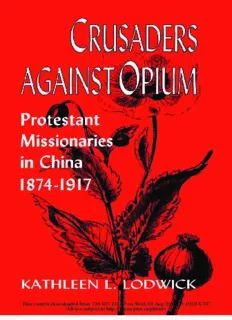
Crusaders Against Opium: Protestant Missionaries in China, 1874-1917 PDF
Preview Crusaders Against Opium: Protestant Missionaries in China, 1874-1917
This content downloaded from 218.107.132.55 on Wed, 03 Aug 2016 05:10:03 UTC All use subject to http://about.jstor.org/terms CRUSADERS AGAINST OPIUM This content downloaded from 218.107.132.55 on Wed, 03 Aug 2016 05:10:03 UTC All use subject to http://about.jstor.org/terms This page intentionally left blank This content downloaded from 218.107.132.55 on Wed, 03 Aug 2016 05:10:03 UTC All use subject to http://about.jstor.org/terms CRUSADERS AGAINST OPIUM Protestant Missionaries in China, 1874-1917 KATHLEEN L. LODWICK THE UNIVERSITY PRESS OF KENTUCKY This content downloaded from 218.107.132.55 on Wed, 03 Aug 2016 05:10:03 UTC All use subject to http://about.jstor.org/terms Copyright © 1996 by The University Press of Kentucky Paperback edition 2009 The University Press of Kentucky Scholarly publisher for the Commonwealth, serving Bellarmine University, Berea College, Centre College of Kentucky, Eastern Kentucky University, The Filson Historical Society, Georgetown College, Kentucky Historical Society, Kentucky State University, Morehead State University, Murray State University, Northern Kentucky University, Transylvania University, University of Kentucky, University of Louisville, and Western Kentucky University. All rights reserved. Editorial and Sales Offices: The University Press of Kentucky 663 South Limestone Street, Lexington, Kentucky 40508-4008 www.kentuckypress.com Cataloging-in-Publication Data is available from the Library of Congress. ISBN 978-0-8131-9285-7 (pbk: acid-free paper) This book is printed on acid-free recycled paper meeting the requirements of the American National Standard for Permanence in Paper for Printed Library Materials. Manufactured in the United States of America. Member of the Association of American University Presses This content downloaded from 218.107.132.55 on Wed, 03 Aug 2016 05:10:03 UTC All use subject to http://about.jstor.org/terms This book is dedicated to the memory of my maternal grandparents: Edith Tremayne Worthington, 1882-1972, who always encouraged my love of reading, and Edward Stephen Worthington, 1879-1954, who, though our years overlapped but few, never refused my request to hear again the story his grandfather had told him of Edward Worthington, who had served as paymaster for George Rogers Clark at the battle of Vincennes in the American Revolution. Grandfather's story always ended as he carefully unrolled his photostatic copy of the payroll he had obtained at the National Archives and helped me read the handwriting of our long-ago ancestor, then a very real person to both of us. Thus I came to know and love history. This content downloaded from 218.107.132.55 on Wed, 03 Aug 2016 05:10:03 UTC All use subject to http://about.jstor.org/terms This page intentionally left blank This content downloaded from 218.107.132.55 on Wed, 03 Aug 2016 05:10:03 UTC All use subject to http://about.jstor.org/terms Contents Acknowledgments ix Introduction 1 ONE Opium in China in the Late Nineteenth Century 11 TWO Missionaries Organize to Oppose Opium 27 THREE The Pro-Opium Forces and Government Investigations 72 FOUR The Anti-Opium Lobby Comes of Age 116 FIVE Success and Failures of Opium Suppression 148 Conclusion 181 Appendix 186 Notes 188 Bibliography 203 Index 210 This content downloaded from 218.107.132.55 on Wed, 03 Aug 2016 05:10:28 UTC All use subject to http://about.jstor.org/terms This page intentionally left blank This content downloaded from 218.107.132.55 on Wed, 03 Aug 2016 05:10:28 UTC All use subject to http://about.jstor.org/terms Acknowledgments Opium suppression in China, and particularly the role of Protestant missionaries in it, is a subject that has drawn my attention from time to time over many years. I first worked on the subject as part of my dissertation at the University of Arizona but later was distracted from the subject by the periodical The Chinese Recorder through which the mission aries had organized their anti-opium campaigns. A National Endowment for the Humanities grant led me to work on an index to The Chinese Recorder for a number of years, the first of which I spent at the John King Fairbank Center for East Asian Research at Harvard University. During that year, 1978-79, the Chinese-made film, titled in English, The opium War was shown in Cambridge and became the topic of lunch time conversations as more and more people at the Fairbank Center viewed it. In one of these conversations, Professor Benjamin Schwartz remarked that one thing we still did not know was why so many Chinese had taken to opium at that moment in their history. That remark stayed with me over the years, and although I moved on to other topics, namely Educating the Women of Hainan: The Career of Margaret Moninger in China, 1915-1942 (University Press of Kentucky, 1995) and a history of the Presbyterian mission on Hainan island on which I am still working, I never gave up my in terest in the topic of opium suppression. From time to time as I studied various aspects of the missionaries' anti-opium activities, I was increasingly struck by the similarities of the arguments about drugs a century ago in China to those in the news media in the United States today. This content downloaded from 218.107.132.55 on Wed, 03 Aug 2016 05:10:31 UTC All use subject to http://about.jstor.org/terms
Description: